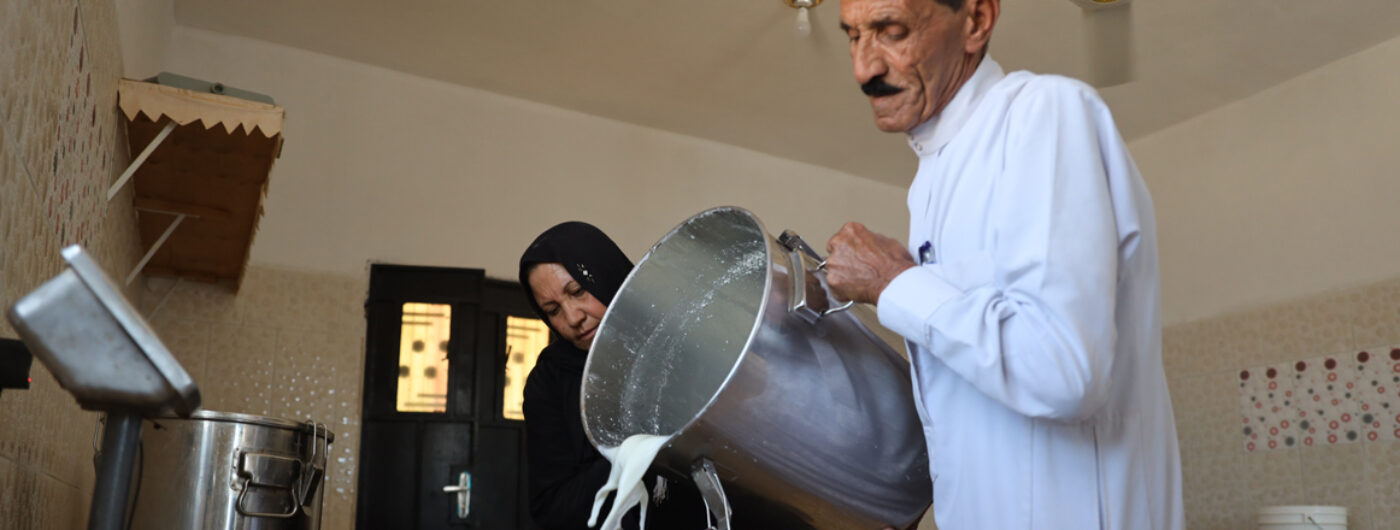
When the craft is born in Syria and flourishes in Jordan
The below success story from the UfM-labelled Smart DESERT project is a courtesy of the International Union for Conservation of Nature (IUCN). The original article can be consulted here.
As the second-largest host country for refugees, Jordan faces significant economic and environmental pressures. Despite international community interventions aimed at mitigating the impact of Syrian refugees, it remains challenging to align available resources with the necessary needs. This has resulted in increased poverty and rising unemployment rates in Jordan. To address these challenges, the Smart DESERT project, funded by the French Development Agency, was initiated with the goal of catalyzing agricultural development in Jordan’s eastern and northern highlands. The project focuses on economically empowering vulnerable Jordanians and Syrian refugees by increasing their income, generating new job opportunities, and improving working conditions.
Prior to the conflict, Abu-Fawaz enjoyed a stable life characterized by hard work, producing high-quality dairy products that attracted clients from various countries. However, the crisis forced Abu-Fawaz to leave his shop and equipment behind and seek refuge in Jordan. He recalled:
“I used to ship my products to Jordan, where my clients appreciated their quality and ordered them in large quantities. Suddenly, I found myself and my family without financial resources or shelter. I had to find work to provide for them, so I began working in agriculture for a modest wage.”
Abu-Fawaz harbored a dream of reopening his dairy shop, a craft he had practiced since childhood. He and his wife started saving small sums of money to purchase milk and produce dairy products. Over time, they managed to resume dairy production using basic equipment and even employed several refugee women who had sought safety in Jordan. Abu-Fawaz’s wife reminisced about their early struggles, saying, “the beginning was very tough, and the work was physically demanding. We, the women, had to work long hours, vigorously shaking and boiling milk to transform it into Labneh and cheese. Afterward, we often experienced physical pain.”
The Smart DESERT project played a pivotal role in supporting Abu-Fawaz and his family. They provided the necessary equipment to enhance production and helped them secure a factory space, allowing for an expansion of their operations. This expansion, in turn, created employment opportunities for eight Syrian women, enabling them to contribute to their families’ well-being in a healthier work environment. Abu-Fawaz’s wife expressed her relief, stating, “now, we can work comfortably. The equipment provided to us has significantly eased our work compared to before. We have an air purifier that eliminates the smell of milk and cheese, a shaking machine that enables us to process larger quantities, and refrigerators for storing greater amounts of milk and cheese. The sanitary basins provided by the project have improved the quality of our products and eliminated the physical exhaustion we used to endure.”
With increased production capacity, Abu-Fawaz’s business was able to employ more female workers and expand its market reach to new governorates. They were delighted to see their products back on the tables of loyal Jordanian customers who had cherished them since their production in Syria.
Looking ahead, Abu-Fawaz aspires to establish a sheep breeding project to secure a steady supply of raw materials for his business. He envisions achieving self-sufficiency for the families working on his project and believes that, with determination, he can surpass his current achievements.
More on the UfM actions on water, environment and blue economy
- Learn more about the Smart DESERT project.
- The Mediterranean region is using about three times more natural resources than its ecosystems can provide. Consult the UfM Environment Agenda to promote a green, circular and socially inclusive economy.
